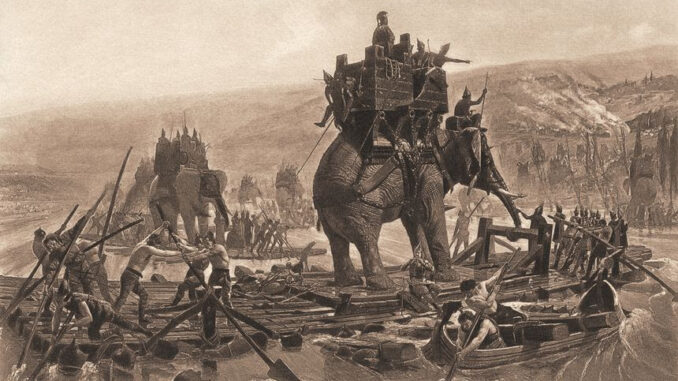T. Belman. Mead sets out three options for Biden; escalate, capitulate or freeze the conflict. He argues against capitulating by saying “A Russian victory would inflict a massive blow to American prestige and the health of the North Atlantic Treaty Organization, especially if the West were seen as forcing Ukraine to surrender to Russian demands.”
I disagree with this assessment.. Biden has repeatedly said it is up to Zelinskyy to curt a deal. That being the case, if Zelinskyy cuts a deal, US and NATO don’t loose much face by endorsing it because they have both backed away from the conflict.
By Walter Russell Mead, WSJ April 4, 2022 6:28 pm ET

We are only six weeks into Vladimir Putin’s war against Ukraine, but the conflict has already settled into a familiar pattern. Both sides often go into wars with a theory of victory, and it is only when both theories fail that the true shape of the conflict begins to appear. In the Second Punic War (218-201 B.C.), Hannibal thought that if he could get an army into Italy and win some conspicuous victories, the other Italian city-states, restless under Roman rule, would revolt and enable him to break Roman power for good. The Romans thought that their superior legions with their fighting spirit and discipline would quickly show Hannibal who was boss.
Both sides discovered that their initial strategies did not work. The Romans were shocked by a series of disastrous military defeats and faced the greatest challenge in Roman history. Hannibal achieved his initial goals, getting his army over the Alps and winning a series of dramatic victories, still studied today by ambitious young military officers all over the world. But his strategy failed. Even after his overwhelming victory at Cannae, only a handful of Italian city-states went over to his side. Roman power survived, and the war dragged on.
World War I started out in much the same way. The French and the Germans had both planned what they hoped would be decisive attacks, the French over their eastern border and the Germans with the Schlieffen plan for an attack through Belgium that would capture Paris. Both offensives fell short, leaving the countries locked in a conflict that neither side knew how to win—and neither was willing to lose.
Something similar seems to be happening with Mr. Putin’s war. The original Russian plan was to break the Ukrainian state by quickly taking the capital and major cities such as Kharkiv. It failed. Ukraine hoped that the shock of military setbacks plus major economic sanctions would either force Mr. Putin to accept peace terms favorable to Ukraine or lead to his overthrow. That plan also seems to have failed, at least for now.
Now both sides are stuck with a war that neither knows how to win, and it is difficult to see the outlines of a compromise peace that both sides can accept. Ukraine cannot accept a peace that leaves it exposed to further Russian aggression and that involves further territorial sacrifice, and Mr. Putin cannot end the war without demonstrable gains at the expense of Ukraine. The logic of warfare now seems to lock the two sides into further, perhaps escalating military, economic and political conflict as each looks for some pathway to victory. Russia is refocusing its military efforts on the east and stepping up the level of violence on the battlefield and against civilians to terrorize Ukrainians into accepting Russian dominance. Ukraine is redoubling its appeal to Western countries for more military aid and tougher economic sanctions.
As the two sides stumble in search of a path to victory, the Biden administration has three ugly options from which to choose.
The first option, helping Ukraine win, is the most emotionally appealing and would certainly be the most morally justifiable and politically beneficial, but the risks and costs are high. Russia won’t accept defeat before trying every tactic, however brutal, and perhaps every weapon, however murderous. To force Russia to accept failure in Ukraine, the Biden administration would likely have to shift to a wartime mentality, perhaps including the kind of nuclear brinkmanship not seen since the Cuban missile crisis of 1962. With China and Iran both committed to weakening American power by any available means, a confrontation with the revisionist powers spearheaded by Russia may prove to be the most arduous challenge faced by an American administration since the height of the Cold War.
But the other two options are also bad.
- A Russian victory would inflict a massive blow to American prestige and the health of the North Atlantic Treaty Organization, especially if the West were seen as forcing Ukraine to surrender to Russian demands.
- Freezing the conflict is also perilous, as this would presumably leave Russia holding even more Ukrainian territory than it did following the 2014 invasions of Crimea and the Donbas. It would be hard to spin this as anything but a partial victory for Russia—and Mr. Putin would remain free to renew hostilities at a time of his choosing.
The failure to deter Mr. Putin’s attack on Ukraine is more than a failure of the Biden administration. Donald Trump, Barack Obama and George W. Bush must share the blame. This failure may prove to be even costlier than failing to prevent the 9/11 attacks, and President Biden’s place in history hangs on his ability to manage the consequences of this increasingly unspeakable and unpredictable war.
WSJ Opinion: Evidence of War Crimes in Bucha Emerge as Russians Retreat



Leave a Reply
You must be logged in to post a comment.